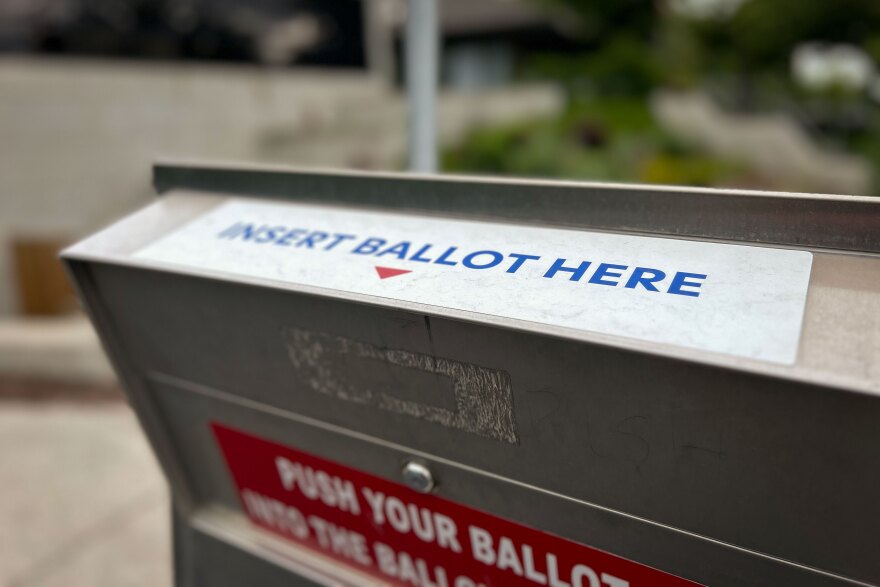After 32 years as the Salt Lake County Clerk, Sherie Swensen retired in 2022. How Utahns cast their votes has changed a lot since she took office in 1990. For years, votes were cast in person.
“In 2008, I remember having to recruit 2,000 poll workers and train them and have them deployed to the precinct polling locations,” she said.
These days, Utah’s elections are conducted by mail.
“I believe that now our county and our state is a model for the way it works and should be run with a vote-by-mail process. It’s so convenient.”
But after the 2020 election, national claims of election fraud, many now disproven, crept into Utah and clerks like Swensen bore the brunt of the pushback from worried voters.
“I can't even tell you how many hours I spent — countless hours — answering emails and trying to assure people that our process was secure and safe.”
The scrutiny was so great that 19 clerks across Utah quit between 2020 and 2022. Swenson left to spend more time with her family and not because of poor treatment. Still, she does not have fond memories of the months after November 2020.
“It was just extremely hard,” she said. “I was threatened several times. it was so heartbreaking to see it turn to that.”
Utah is a supermajority Republican state, which means the June 25 primary is the toughest test many GOP candidates will face this election season.
“We want to make sure that everything runs as smoothly as possible,” said Davis County Clerk Brian McKenzie.
“And that started for us months ago, beginning in January. As soon as candidates started filing, we started looking at that and trying to decide what the election would look like, what kind of resources we'd have to have in place and have those things ready to go.”
In Davis County, the clerk’s office just remodeled its voter observation area and added 40 windows so people can watch the counting process for themselves. Even in smaller counties like Summit, clerks and their staff have been busy fielding questions from curious voters.
“Solidly one person is answering questions all day between now and the election,” said Clerk Eve Furse. “And then as we get closer [to Election Day] more of us will be on that line.”
That workload is the new normal across the state.
“Some of the former clerks or older clerks or longer term clerks that I've talked to, what they've said is you knew you ran a great election when nobody knew your name,” said Furse.
“I understand that and I would love that, but it's not what it is anymore. We need to be talking with our communities and telling them what's happening on a regular basis. It's just a much more public role, I think, than maybe it was previously.”
State laws were also passed that changed the vote counting process. County clerks now have to report to the public how many ballots they’ve received on a daily basis on their respective websites.
“All of those things kind of come together in that effort of engaging with the citizens and helping them understand how elections are administered here in the state of Utah,” McKenzie said.
Counties are also hosting informational sessions to answer as many questions as possible, and testing their voting machines. Those with questions about the voting process are encouraged to reach out to their local county clerk.
“We all want to have a successful election,” Furse said. “If one of us fails, it's bad for all of us. Everybody wants this to work so reach out and ask for help.”
The May 31 felony convictions of former President Donald Trump could also add an additional layer of scrutiny. Trump and his allies have repeatedly called the legal cases brought against him politically motivated and meant to help President Joe Biden’s chances at reelection.
That won’t change how McKenzie, his staff or other clerk offices across Utah approach this year’s election.
“What we're focused on is making sure that the election runs as smoothly as possible, regardless of what the results are,” he said. “We'll let the voters determine what those are going to be.”
If anything, Furse thinks that makes a clerk’s community outreach some of the most important work they’ll do.
“When I heard that news, I definitely thought there are going to be more people with questions and concerns. We need to be ready to accommodate that and make sure that folks feel that they can see what they need to see and have an understanding of the process because there are going to be a lot of people who are worried.”
Primary ballots will be mailed out June 4. Utah’s primary election is June 25.






